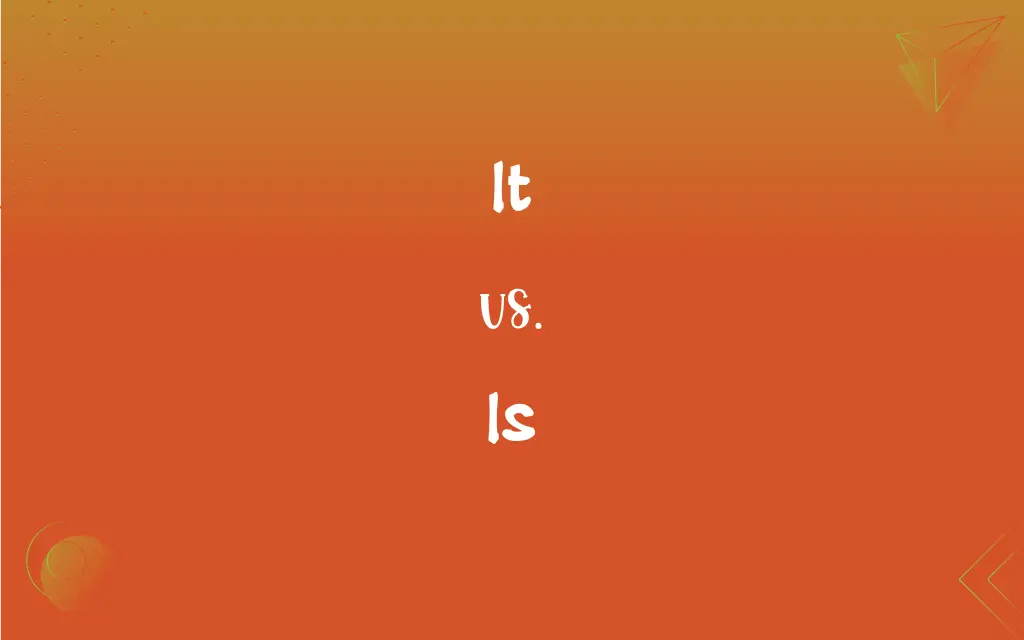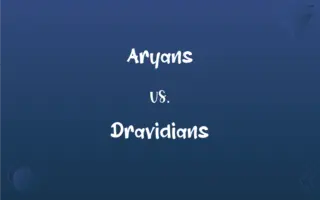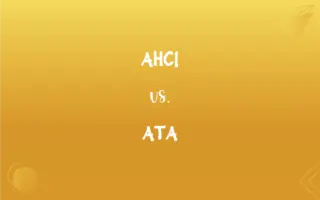It vs. Is: What's the Difference?
Edited by Aimie Carlson || By Harlon Moss || Published on February 5, 2024
"It" is a pronoun used to represent a noun previously mentioned or easily identified, while "is" is a verb that serves as the third-person singular present of "be."

Key Differences
"It" is a pronoun used to refer to a subject previously mentioned or understood from the context. "Is" is a form of the verb "to be," used as a linking verb to connect the subject with a noun, adjective, or phrase that describes it.
In English grammar, "it" serves as a placeholder for a noun or noun phrase, avoiding repetition. Conversely, "is" is employed to express existence, identity, or the characteristics of the subject.
"It" is versatile, representing objects, animals, or abstract concepts, but it does not convey any action itself. "Is," however, is action-oriented, denoting a state of being or condition of the subject.
"It" can be used impersonally, like in the expression "it is raining," where "it" does not refer to a specific object. "Is" in such sentences serves to establish a state (raining) as a present condition.
"It" often introduces a subject in sentences, setting the stage for further information. "Is" provides the crucial link in such sentences, asserting a specific attribute or state of the subject introduced by "it."
ADVERTISEMENT
Comparison Chart
Part of Speech
Pronoun
Verb
Function
Represents or replaces a noun or noun phrase.
Indicates existence, state, or quality.
Sentence Role
Subject, object, or complement.
Main verb in present tense for third-person singular.
Usage in Impersonal Form
Used impersonally to denote an action or situation.
Used to describe a state or condition.
Example Sentences
"It is a beautiful painting." (refers to 'painting')
"The sky is blue." (describes 'sky')
ADVERTISEMENT
It and Is Definitions
It
"It" is used for animals when the gender is unknown or irrelevant.
I have a cat. It is very playful.
Is
"Is" is the third-person singular present form of "to be."
She is a talented musician.
It
"It" substitutes a previously mentioned noun to avoid repetition.
I bought a new phone. It works great.
Is
"Is" is used in stating facts or truths.
Water is essential for life.
It
"It" can refer to a general situation or condition.
It is raining outside.
Is
"Is" links the subject to a complement that describes it.
The answer is correct.
It
"It" is a pronoun to represent a non-human entity or object.
Look at the bird, it is flying.
Is
"Is" forms part of many contractions, like "it's" for "it is."
It's a nice day today.
It
"It" serves as a placeholder in sentences like 'it is' or 'it seems.'
It is important to be kind.
Is
"Is" indicates the existence or presence of something.
There is a book on the table.
It
An animal that has been neutered
The cat is an it.
Is
Third person singular present indicative of be.
It
The third-person singular personal pronoun used to refer to an inanimate object, abstract entity, or non-human living thing.
Take this book and put it on the shelf.
Take each day as it comes.
I found a poor little cat. It seems to be half starving.
Is
Used in phrases with existential there when the semantic subject is a third-person plural.
There is three of them there.
Is
(Geordie) me.
Is
(rare) i's.
Is
The third person singular of the substantive verb be, in the indicative mood, present tense; as, he is; he is a man. See Be.
For thy is I come, and eke Alain.
Aye is thou merry.
To-morrow is the new moon.
FAQs
What kind of verb is "is"?
"Is" is a linking verb, connecting the subject to a descriptor.
How is "is" used grammatically?
"Is" is used as the third-person singular present of the verb "to be."
Can "it" be used for abstract ideas?
Yes, "it" can represent abstract concepts or situations.
Can "it" refer to people?
Usually, "it" refers to objects or animals, not people, except in impersonal constructions.
Is "it" always necessary in a sentence?
"It" is used based on context and can be omitted in some informal or imperative constructions.
How does "is" differ from other forms of "to be"?
"Is" is specifically for singular, third-person present tense, unlike "am" or "are."
Can "is" function alone as a predicate?
Yes, "is" can be the sole verb in a predicate, often followed by a noun or adjective.
What does "it" represent in a sentence?
"It" is a pronoun representing a noun previously mentioned or implied.
How does "is" help in forming questions?
"Is" is used in forming questions like "Is this your book?"
Is "is" used in past tense?
No, "is" is only used in the present tense; "was" is the past tense form.
What does "is" convey in a sentence?
"Is" conveys existence, state, or quality of the subject.
How is "it" used impersonally?
"It" is used impersonally to refer to general conditions or situations, like "it is raining."
Is "it" used in formal writing?
Yes, "it" is appropriate in both formal and informal contexts.
How does "is" interact with adjectives?
"Is" links subjects with adjectives to describe their state or quality.
How does "it" function in expressions like "it seems"?
In such expressions, "it" serves as an impersonal subject.
What's the contraction form of "is"?
"Is" forms contractions like "it's" (it is) and "he's" (he is).
What is an example of "it" as a subject?
"It was a dark and stormy night."
Can "it" be used in place of a person's name?
Generally, "it" is not used for people except in specific idiomatic expressions.
Does "is" have a plural form?
Yes, the plural form of "is" is "are."
Can "it" replace a whole idea or clause?
"It" can sometimes refer back to a whole idea or clause, summarizing it.
About Author
Written by
Harlon MossHarlon is a seasoned quality moderator and accomplished content writer for Difference Wiki. An alumnus of the prestigious University of California, he earned his degree in Computer Science. Leveraging his academic background, Harlon brings a meticulous and informed perspective to his work, ensuring content accuracy and excellence.
Edited by
Aimie CarlsonAimie Carlson, holding a master's degree in English literature, is a fervent English language enthusiast. She lends her writing talents to Difference Wiki, a prominent website that specializes in comparisons, offering readers insightful analyses that both captivate and inform.































































